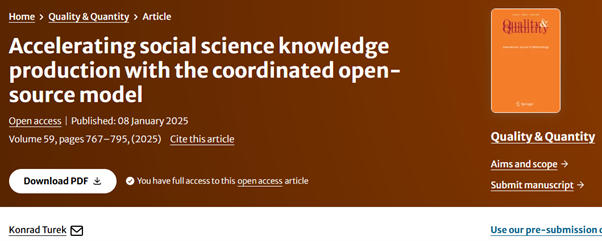Article on CPF and open science
In this new article, Konrad Turek discusses open science and refers to the Comparative Panel File. What it means to “open” knowledge production in social science? Especially through open-source and crowd-based collaboration?
Open science is changing how we produce, verify, and share knowledge. And it’s not just about open-access publications, preregistration, or replication studies. It’s also about rethinking how we collaborate and build scientific infrastructure. Open source tools, code sharing, collaborative workflows, crowd-based cooperations – these can be powerful ways to work faster, smarter, cheaper, and across disciplines. They help us tackle big questions and innovate in ways that traditional structures sometimes can’t. Natural sciences are leading the way in these developments. But in social science? The shift to open is happening much more slowly.
CPF Open Harmonization is a good example of open collaborations. This is where researchers work together in dynamic, open networks, even if they’re not formally connected. These kinds of initiatives don’t replace traditional research infrastructures, but they can be powerful complementary solutions. In computational social science, especially where heavy coding is involved, they have great potential.
💡 Have a look at the full paper for a deeper dive into the topic: open article : Turek K. (2025) Accelerating social science knowledge production with the coordinated open-source model, Quality & Quantity. https://doi.org/10.1007/s11135-024-02020-7

Comments